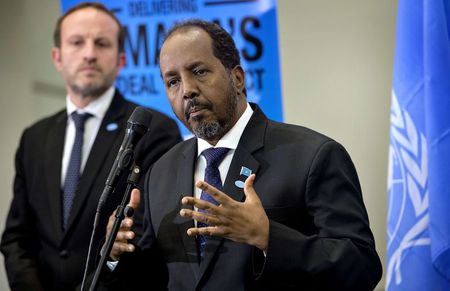By Sabina Zawadzki and Annabella Nielsen
COPENHAGEN (Reuters) - Somalia's president said on Thursday a military campaign would push Islamist al Shabaab fighters out of all towns and major territories by the end of the year, though the militants would still be able to mount guerrilla attacks.
African Union and Somali forces have already retaken many strategic towns and ports in recent months, cutting off al Shabaab's route to the sea and revenue streams, while U.S. air strikes killed the group's leader in September.
But the al Qaeda-linked group, which has also launched assaults in neighbouring Kenya and vowed to fight on under a new leader, still controls tracts of land in southern regions and continues to launch bomb and gun attacks in the capital.
President Hassan Sheikh Mohamud told Reuters the offensive would drive the militants away from towns and other territory into the "remote, rural hinterland" by December.
"We are planning that by the first quarter of next year there will not be a territory, space, controlled by al Shabaab," he said in an interview during a donors' conference in Denmark.
"We know that is not the end. We know al Shabaab will melt into society and keep continuing this asymmetric urban warfare for some time but that is the next phase of the conflict."
Government and African troops pushed al Shabaab out of Mogadishu in 2011, raising hopes of a return to order in a nation torn apart by more than two decades of conflict and famine.
Donors poured in aid and Somali lawmakers elected Mohamud as president in 2012, the first such vote in decades. The next vote is in 2016.
"Yes, I'm a candidate, we have the political party, and we are all waiting for the political party law to be established," he said when asked if he would run.
But the signs of progress, including a construction boom in the capital, have been undermined by political infighting.
In the latest row, the president overruled a cabinet reshuffle by Prime Minister Abdiweli Sheikh Ahmed. A group of lawmakers have called for the premier to quit, but a no confidence vote in parliament last week was interrupted by rowdy MPs.
Mohamud said a raucous debate was a sign of progress in a country formerly riven by clan warfare.

"We use the parliamentary procedures and then we vote. That's the only way out," he said.
(Writing by Sabina Zawadzki; Editing by Andrew Heavens)